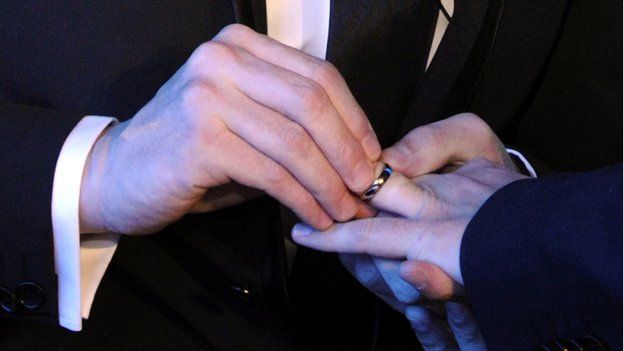NI Life and Times Survey shows growing support for gay relationships
- Published

The number of people who oppose same-sex relationships in Northern Ireland has dropped significantly over the last 25 years, a survey has suggested.
The NI Life and Times Survey recorded the views of 1,200 people across Northern Ireland on a range of issues.
The number of respondents who said gay relationships were "always wrong" fell from 76% in 1989 to 28% in 2012.
Support for gay relationships in the 2012 survey was greatest among younger people, women and Catholics.
However, the 2012 survey also suggested that a third of people in Northern Ireland disapprove of gay people adopting children and are opposed to lesbians having equal access to fertility treatment.
'Positive attitudes'
The latest available data from the NI Life and Times Survey (NILT) was interpreted by researchers from Queen's University, Belfast (QUB).
They found that attitudes had softened in Northern Ireland over the last two decades, leading to a growing acceptance of same-sex relationships.
In general, women and people aged under 65 were more likely to express positive attitudes to same-sex relationships as they completed the survey.
In December 2005, Northern Ireland became the first part of the United Kingdom to introduce civil partnerships for gay and lesbian couples.
But at present, it is the only part of the UK which is not in the process of legalising gay marriage.
Dr Nicola Carr, from QUB School of Sociology, Social Policy and Social Work, said: "Over half of the survey's respondents expressed support for same-sex marriage.
"However, over one-third disapproved of gay adoption and also to lesbians having access to fertility treatment on the same basis as heterosexual women."
Religious affiliation
Dr Carr added: "At least one-in-four people did not believe that a lesbian or gay parent, or parents with a child, constituted a 'family'."
Her colleague at the School of Sociology, Social Policy and Social Work, Dr Siobhan McAlister, identified differing trends according to the religious affiliation of those who took part in the survey.
"Respondents declaring a Protestant affiliation were more likely to report negative attitudes towards same-sex marriage than Catholics, or people declaring 'no religion'," Dr McAlister said.
Almost three-quarters (74%) of people who said they had no religion said they would support the introduction of same-sex marriage.
'Negative views'
Two-thirds (66%) of Catholics also said they were in favour, but among Protestant respondents, less than half (45%) said they supported gay marriage.
"Beliefs about homosexuality were also found to be influential. People who viewed homosexuality as a 'choice' tended to hold more negative views than those who believed sexual orientation cannot be changed," Dr McAlister added.
The NI Life and Times Survey survey was carried out by ARK, a joint resource between QUB and the University of Ulster.
The annual study, which records public attitudes to a wide range of social issues, began in 1998.
- Published11 December 2013
- Published10 December 2013
- Published5 February 2013